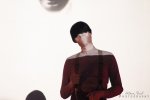Jonathan Bree
Bio

Jonathan Bree is a musician from New Zealand, known for melodic compositions where he croons about modern life and love, over string parts that slide precariously between notes and dulcitone chimes. The end result is a musical palette one could describe as dark Disney. These elements are present in his breakthrough viral hit, You’re So Cool (30 million views on YouTube and counting).
H?is latest album Pre-Code Hollywood transports listeners to a complex sonic world that celebrates classic pop of a bygone era, while experimenting with the avant-garde in a way that is distinctly modern. The album, the fifth from New Zealand-based artist Jonathan Bree, exudes a nostalgic charm reminiscent of a John Hughes movie soundtrack. A producer and musician best known for his cinematic brand of orchestral pop, Bree’s deep baritone and musical arrangements—which often feature sliding strings and chamber instruments such as the celeste, harp, and timpani—draw inspiration from classic artists like Lee Hazlewood and Serge Gainsbourg, but are reborn as something entirely his own. A “dark disco album full of sad bangers,” Pre-Code Hollywood synthesizes Bree’s years of experience and craftsmanship into a refined, focused, and bold collection. It’s his most pop-forward and exciting work to date.
His live shows have also gained him a cult following across the world. Masked band members in pioneering clothing are set against a backdrop of cinematic projections created specifically for each song. Unusual for an indie act, he also has two dancers who perform other-worldly choreographed routines along with the music.
After You’re So Cool went viral, many likely assumed Jonathan Bree was a new artist. He began writing his own songs at age 9 and performed live as a drummer in his cousin’s band until age 13. This was interrupted after being sent to live in Australia with his father, who was an aspiring cult leader. Bree subsequently left home and independently navigated his teenage years.
When Bree returned to New Zealand, he formed The Brunettes, who in their active years toured the world and released music through Sub Pop Records and Bree’s own label, Lil Chief Records. The frustrations of trying to take this traditional route to success saw him take a long break from releasing his own music. In the interim, he happened to produce the song The Cigarette Duet for Princess Chelsea (in 2011) and directed it's viral video.
When he finally returned to releasing his own music it was as a solo artist with the album, The Primrose Path (2013). His only promotion for it was uploading to YouTube an album length video of himself watching shows on his laptop in bed accompanied by his girlfriend and cat.
Bree’s second album A Little Night Music (2015) saw him embrace a more cinematic approach, while retaining strong melodies and hooks. Nonetheless, it is his least pop-focussed album to date and leans more heavily on classical soundscapes - Nick Cave meets the Nutcracker Suite. It was during this album campaign that Bree first introduced the concept of his period piece masked band. The debut single/video Weird Hardcore (2014) featured his musicians appearing as if within a skewed timeline, think Amadeus meets The Old Grey Whistle Test. It's rumoured that around this time Jonathan acquired a time machine…
In the lead-up to his third album Sleepwalking, he released You’re So Cool which was named Time Out New York’s Video of the Year. Sleepwalking (2018) has a heavy orchestrated element featuring real strings, horns, celeste and soprano vocals. His arrangements draw distinct influence from orchestral pop of a bygone era (think Lee Hazlewood & Nancy Sinatra), but many of the songs dip in and out of the avant-garde in a way that is also distinctly modern.
Jonathan Bree’s fourth album After The Curtains Close released in 2020 sees the producer's trademark orchestral pop take a few unexpected turns both into the experimental and also into kitschy territory populated by some of his french heroes of the 1960's. The end result is an album that retains Bree’s musical DNA while being fun and varied.
What could be described as Bree’s ‘sleazy’ album could also be described as Bree’s break-up album. Dealing with the break-down of a major relationship Bree opens up to reveal a year of loneliness and mental trauma while also channelling positive feelings by embracing sex and sleaze in his music, subject material more traditionally reserved for the single man. Bree strikes a great balance here between darkness and silliness here in that he does this without appearing snide, which is a line some artists can seem all too happy to cross.
Links
Image Galleries
Comments (Newest First)
There are currently no comments for this artist.
Search for Bands/Artists:
Latest Galleries
NZ Top 10 Singles
- APT.
ROSÉ And Bruno Mars - DIE WITH A SMILE
Lady Gaga And Bruno Mars - BIRDS OF A FEATHER
Billie Eilish - TASTE
Sabrina Carpenter - I LOVE YOU, I'M SORRY
Gracie Abrams - ESPRESSO
Sabrina Carpenter - SAILOR SONG
Gigi Perez - LOSE CONTROL
Teddy Swims - A BAR SONG (TIPSY)
Shaboozey - GOOD LUCK, BABE!
Chappell Roan








 Add A New Artist
Add A New Artist





 Report A Problem
Report A Problem

